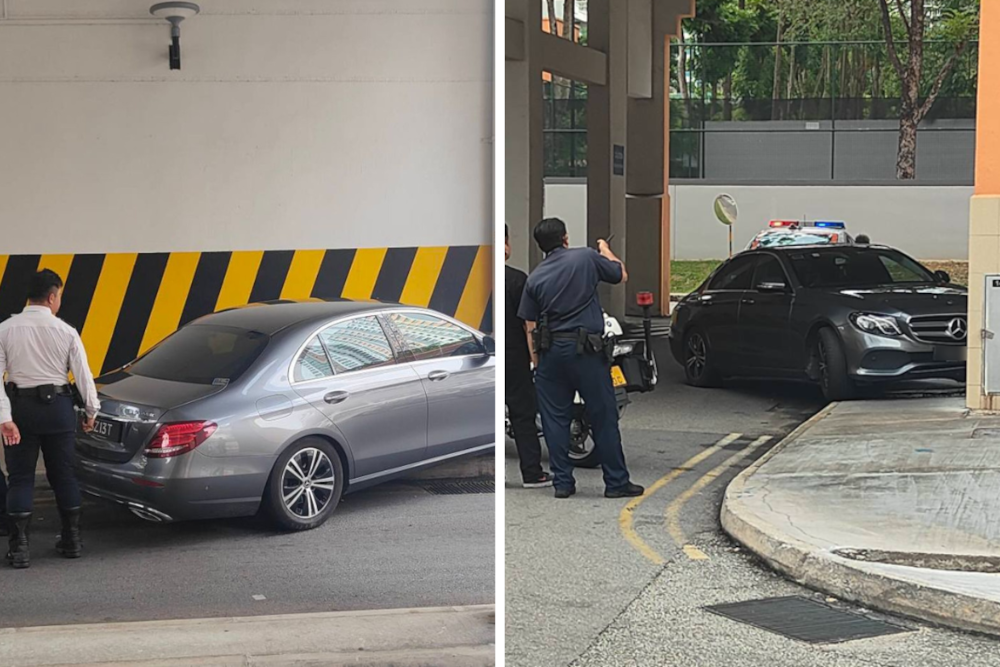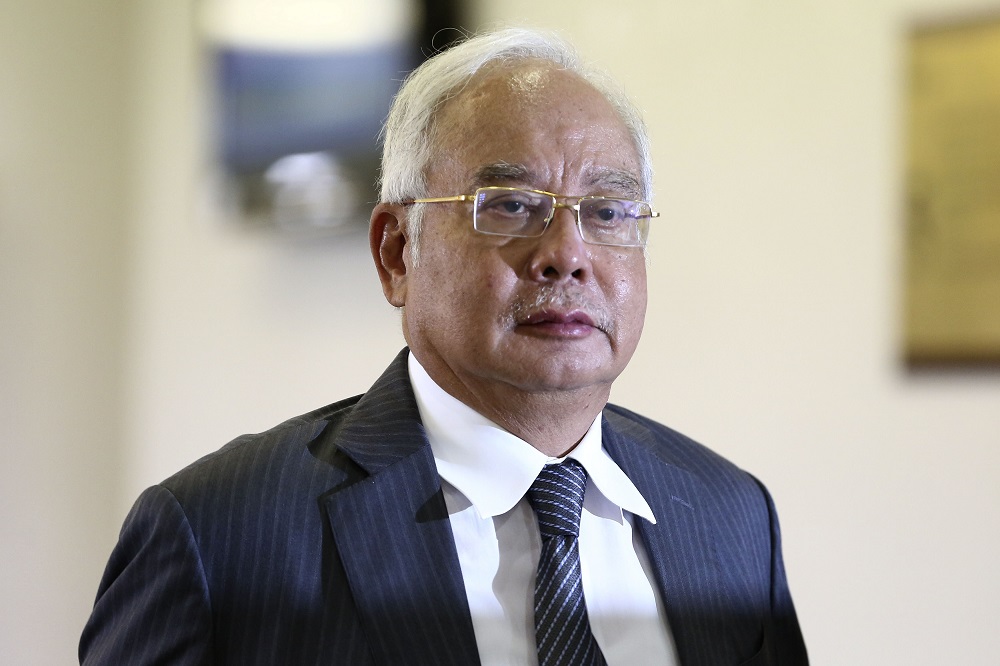KUALA LUMPUR, May 8 — Datuk Seri Najib Razak would not be alerted if suspicious transactions were detected in his personal bank accounts as it would go against the country’s anti-money laundering law, a central bank official told the High Court today.
Bank Negara Malaysia (BNM) manager Ahmad Farhan Sharifuddin confirmed that anti-money laundering laws require reporting institutions such as banks to report suspicious transactions in their clients’ accounts to BNM via Suspicious Transaction Reports (STR).
Ahmad Farhan was the BNM investigating officer in charge of a probe on the AmBank Group over its failure to give the STR on multiple transactions in six accounts — including four of Najib’s current accounts and two credit card accounts linked to him, which the bank was later fined for in November 2015.
Najib’s lead defence lawyer Tan Sri Muhammad Shafee Abdullah asked the central bank official if he thought the former prime minister would equally be alerted if AmBank found suspicious transactions.
“Would you agree if AmBank had done their job and submitted suspicious transaction report to Bank Negara, the account holder would have been alerted to protect himself?”
But Ahmad Farhan replied that this would not be allowed under the Anti-Money Laundering, Anti-Terrorism Financing and Proceeds of Unlawful Activities Act 2001 (AMLA).
“There is a specific provision under AMLA that prevents tipping off.
“The reporting institution should not disclose. They only submit STR, the reporting institution not allowed to disclose to the person.
“Your question is saying whether Datuk Seri Najib should be alerted. That one is tipping off,” he said in court.
Shafee then persisted in asking the same question.
But Ahmad Farhan replied: “I would have to disagree, because that’s tantamount to tipping off which is prohibited under AMLA.”
Shafee then asked if Najib would have been called if the suspicious transactions detected resulted in investigations by the police and the Malaysian Anti-Corruption Commission.
“If AmBank had reported STR transaction by transaction, then there’s a possibility that Bank Negara in the investigation or any of the enforcement agencies like MACC or the police would have to call the account holder to explain the suspicious transaction. That’s not tipping off, that’s investigating,” Shafee asked.
Ahmad Farhan declined to answer the hypothetical question.
“I have no comment. That one is inference question, you say should have… My answer to your question is I have no comment.”
Ahmad Farhan pointed out that the hypothetical scenario did not happen when Shafee continued to press him on the matter.
“In the first place, STR was not submitted to us,” the witness said, drawing laughter from those present in the courtroom.
Ahmad Farhan, a manager at BNM’s Financial Intelligence and Enforcement Department, today explained that STR received by the central bank would be sent to a separate BNM unit that analyses and examines the STR.
He said the STR would be analysed to identify any potential offences such as corruption before the information is forwarded to the relevant enforcement agencies for the latter to carry out investigations.

He later explained to Najib’s lawyer Harvinderjit Singh that BNM would only carry out its own investigations based on the information in the STR if BNM identifies potential offences under laws falling under the central bank’s jurisdiction, such as the offence of illegal deposit-taking.
Ahmad Farhan is the fourth prosecution witness in Najib’s ongoing trial involving seven charges of abuse of position, money-laundering and criminal breach of trust over RM42 million of former 1MDB unit SRC International Sdn Bhd’s funds.
Evidence that previously emerged in court during the trial include transactions that flowed in and out of Najib’s accounts.
After Shafee’s questioning, Harvinderjit then cross-examined Ahmad Farhan with a similar aim of determining if the account holder would be notified and asked regarding suspicious transactions once the STR triggers investigation by BNM or law enforcement agencies on the potential offences.
Harvinderjit quizzed Ahmad Farhan on whether it was his opinion that the account holder does not have to be interviewed over “suspicious transaction offences”, but the BNM official pointed out the wrong terminology used and indicated he could not speak for what investigators from other agencies would do.
“The word you used, you keep saying investigation into suspicious transaction, but when we go to law enforcement agencies, for example like corruption, so the investigation is into corruption offences.
“It’s not investigation of suspicious transactions, which I can’t answer for MACC,” he said.
When asked by Harvinderjit to confirm that he cannot answer for law enforcement agencies on whether they would need to interview a bank account holder in investigations resulting from suspicious transactions in the account, Ahmad Farhan said: “That’s correct.”
Harvinderjit then asked if Ahmad Farhan agreed that he could have interviewed the account holder during his “investigation” under AMLA’s Section 14 of the obligation of banks to report suspicious transactions, the latter disagreed.
Among other things, Section 14 covers a bank’s obligation to promptly report transactions that exceed a certain amount, as well as when the bank has reason to suspect the transaction involves funds from illegal activities due to the identity of the person involved or due to the transaction itself or its surrounding circumstances.
Citing AMLA provisions, Harvinderjit said Section 25 allows BNM to examine reporting institutions (such as banks) and Section 26 allows BNM to interview any customers of reporting institutions.
“Examination here, not investigation, my learned counsel,” Ahmad Farhan said in exasperation as he corrected Harvinderjit and to great laughter in the courtroom.
As Harvinderjit continued asking Ahmad Farhan, the bank official responded by saying: “Don’t confuse yourself, examination and investigation is different.”
Harvinderjit then adopted Ahmad Farhan’s position when further asking him: “You are saying in coming to the conclusion that there was breach of Section 14, you conducted examination, not investigation? Are you saying as part of that investigation, you are not entitled to seek information from the account holder or entitled but didn’t see the need to do it in your scope of investigation?”
“I’m not sure,” replied Ahmad Farhan, whose 2015 probe revolved around whether AmBank had failed to submit STRs to BNM.
Harvinderjit further asked: “The STR requirement, that is for the protection of members of the public, inclusive of account holders?”
“Protection? I have no idea,” Ahmad Farhan responded before Harvinderjit ended the cross-examination.
During Ahmad Farhan’s exchanges with the defence lawyers where the BNM officer seemingly grew increasingly exasperated at their questions, the judge who usually has a serious and stoic demeanour broke into a smile.
Even Najib himself seemed amused with a smile on his face as he turned towards those present in the public gallery.
Today is Day 15 of Najib’s trial before High Court judge Mohd Nazlan Mohd Ghazali, which will resume tomorrow.




















